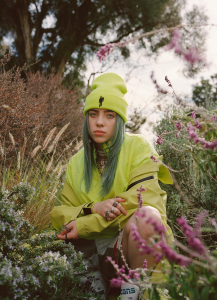Before last Friday, it seemed like Billie Eilish couldn’t get any bigger. She’s just finished headlining her second tour, she’s almost made it to 16 million Instagram followers and her debut single “ocean eyes” has gone platinum in the U.S., Australia and Canada. However, with the release of “WHEN WE ALL FALL ASLEEP, WHERE DO WE GO?,” the 17-year-old has proved she still has aces up her sleeve.
With her first studio album, Eilish continues her control of pop noir. Everything from warped vocals to echo effects accent many of the tracks, and it feels like more of a soundtrack for a horror film than music from a teen who still wears invisible braces.
In several of the songs, we’re reminded of Eilish’s youth. In “!!!!!!!,” we hear her remove her Invisalign and introduce her album. On “8,” her vocals seem to be age-regressed to those of her eight-year-old self. Then, on “my strange addiction,” she samples sounds bites from the seventh season of “The Office,” including Steve Carell’s character Michael Scott, who introduces the song.
“No, Billie, I haven’t done that dance since my wife died,” he says.

Photo Courtesy: Billie Eilish Facebook
While the song’s lyrics can be taken as a note to a love interest, the ambiguity still leaves the door open to the idea that the song itself is about “The Office,” something that Eilish has an obvious affection for. Eilish told MTV that she had no idea that the samples would make it to the final cut.
“When we made the beat for ‘my strange addiction,’ it reminded me of the song they play when they do the Scarn dance,” Eilish said. “I thought that was really funny, so we literally just ripped the audio from Netflix and put it in the song, not at all thinking that they would say yes to it and we’d be able to put it out. Also, it’s about strange addictions, and ‘The Office’ is mine.”
The best moment of “WHEN WE ALL FALL ASLEEP, WHERE DO WE GO?” is “bad guy.” The song opens with a heavy bass line reminiscent of The White Stripes’ “Seven Nation Army,” and the syncopation of the vocals are snappy enough to keep up with the electro beat in the background.
On the track, Eilish frames herself as the villain and embraces her sexuality.
She sings, “I’m that bad type/ Make your mama sad type/ Make your girlfriend mad type/ Might seduce your dad type/ I’m the bad guy/ Duh.”
Eilish recently faced backlash for “wish you were gay,” a sort-of lamentation about a boy who doesn’t love her back. While fans hoped it would be an LGBTQ anthem, many were disappointed, claiming that the track was queerbaiting. In an interview with Popbuzz, Eilish said she meant no harm to the LGBTQ community.
“The whole idea of the song is, it’s kind of a joke,” she said. “It’s kind of like ‘I’m an ass, and you don’t love me. And you don’t love me because you don’t love me, and that’s the only reason. And I wish you didn’t love me because you didn’t love girls.’”
Eilish continues to dazzle with the quieter tracks on the album. Her quintessential breathy vocals excel on “when the party’s over” and “i love you,” which features the use of an acoustic guitar, something rare for Eilish.
On paper, it’s easy to dismiss Eilish as another Californian teenager looking to break into mainstream music. Coming from a family of musicians and being involved in professional singing groups since she was eight, she seems to have been set up for success.

Photo Courtesy: Billie Eilish Facebook
With the help of her brother Finneas O’Connell, who produced all of the tracks on “WHEN WE ALL FALL ASLEEP, WHERE DO WE GO?” Eilish successfully touches on human emotion — from the grim fog of a breakup in “i love you” to the sting of unrequited love in “wish you were gay” and the frustration behind prescription drug abuse in “xanny.”
In her debut, Eilish continues the honesty and authenticity that her fans fell in love with. She’s not trying to be anything she’s not, and you can practically hear the adolescent eye-roll in her songs.
Though she succeeds in the softer, low tones, she has the chops to push the limits. Her music is ambitious and translates her indifference to mainstream sound. Eilish is redefining Gen Z’s contribution to music, and it’ll be interesting where she goes from here.






